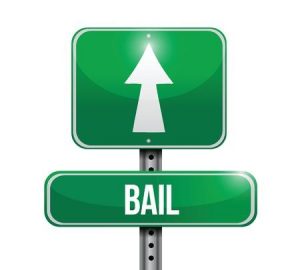There are many articles about how to bond someone out of jail, including this one – How Bail Bonds Work in Virginia. However, very often, the best thing to do is not post bail. This article gives some guidance and examples of when not to bail someone out of jail.
 It’s important to understand that the cosigner to a bail bond is financially responsible for the bond. This means if that the person who is bonded out of jail later skips a court date, the cosigner is on the hook for the full amount of the bail bond.
It’s important to understand that the cosigner to a bail bond is financially responsible for the bond. This means if that the person who is bonded out of jail later skips a court date, the cosigner is on the hook for the full amount of the bail bond.
As a bail bondsman, I’ve seen several occasions where the cosigner regrets signing for the bond. This happens frequently between family members. There’s all kinds of emotions involved, mainly, the thought of a loved one sitting in jail is too difficult to deal with, and so they’ll bond the family member out of jail. Later, after the person skips court, they feel betrayed and hurt that the person would be so ungrateful and inconsiderate to have stuck them with a debt.
Another scenario is the girlfriend who bonds out the boyfriend, or visa versa. This is completely different than family members, in that, unlike a family member, boyfriends and girlfriends come and go. The significance of this can’t be overstated. For example, say a girl bonds out her boyfriend. Three weeks later they get in a argument and break up. Depending on the circumstances of the breakup, the boyfriend would not think twice to put an additional debt on her. In fact, he likely gets some satisfaction on sticking it to her. It’s because of this dynamic that I, as a bondsman, often ask for an additional cosigner. Of course, it depends on the situation. There’s a difference between a couple who are in the late thirties and have been dating for four years, and a couple in their early twenties who’ve been dating for three months.
Another factor in the girlfriend-boyfriend scenario is the savior complex. This is especially true with guys. Guys seem to have a need to be the knight in shining armor. Now it should be stated here that I’m not a certified psychologist. This is just my opinion based on my life experiences and observations. But say a young woman is arrested on a prostitution charge. Her former high school boyfriend, with whom she’s still friends, bonds her out. Oh yeah, by “friends” I mean that she calls him when she needs something and he complies. Anyhow, in his mind, bonding her out of jail will somehow show her that he’s the one who really cares for her and not those loser-guys who just what to have sex and share drugs with her and are responsible for dragging her down. And after she realizes this, she will be forever grateful and worship him. She will then decide to settle down and marry him, bare his children and happily file their taxes the rest of their lives, all the while loving him for being her white knight. It rarely turns out as he thought. She’s doesn’t go back to him, but stays mired in her destructive ways, and ends up skipping court and moving to Florida to be a crackwhore while he’s left paying the full bond and feeling like a dunce. OK, I exaggerated a bit about becoming a crackwhore just to make a point.
So, if you’re thinking of bonding someone out of jail, please consider a few things. If the person in jail is a drug user, think twice; drug users are the most likely to skip court. By drug user, I’m not talking about a casual marijuana user, I’m talking about an drug addict. First, a true addict doesn’t care about anything except their next fix. Very often, they’ve burned most of their bridges. Second, the addict understands that when they’re sitting in jail, they’ll be forced to go cold turkey and they’ll do anything to avoid that.
 I recall a conversation I had with a semi-retired woman who wanted to bond out her non-biological son. She was a widow in her sixties, and he was in the Henrico Jail on a drug charge with a $2500 bond. She had told me while she had the $2500 to pay a cash bond, she didn’t want to use it up front. [ Note: this means that she’s a very good cosigner. When the cosigner is really good, the defendant doesn’t have to be a sure thing because the cosigner has the money to pay the full bond should the defendant skip court. ] Her and her husband had worked and saved, so she was financially comfortable, but not so wealthy that $2500 didn’t matter. As I talked to her, the picture she painted was the son has not had employment for a considerable amount of time, and was taking drugs but she didn’t think he was a hard addict. I asked her enough pointed questions so that she talked herself out of bonding him out without feel guilty about it. Then, a couple weeks later she called me again. But this time, she was upset. She was very emotional and told me something like, “I don’t care; I have to get him out. This is too much for me.” I asked her what was going on. She said that he was calling her and she just felt so guilty. So I asked her what has changed, or what will change, to make it a now good decision. Between talking it out and realizing that nothing had changed, she again decided, and once and for all, to not bond him out. I consider this bond which I didn’t write to be one of my good plays as a bondsman. I have no doubt he would have skipped on her. He had burned all of his bridges with this other family members, and she was the last one remaining.
I recall a conversation I had with a semi-retired woman who wanted to bond out her non-biological son. She was a widow in her sixties, and he was in the Henrico Jail on a drug charge with a $2500 bond. She had told me while she had the $2500 to pay a cash bond, she didn’t want to use it up front. [ Note: this means that she’s a very good cosigner. When the cosigner is really good, the defendant doesn’t have to be a sure thing because the cosigner has the money to pay the full bond should the defendant skip court. ] Her and her husband had worked and saved, so she was financially comfortable, but not so wealthy that $2500 didn’t matter. As I talked to her, the picture she painted was the son has not had employment for a considerable amount of time, and was taking drugs but she didn’t think he was a hard addict. I asked her enough pointed questions so that she talked herself out of bonding him out without feel guilty about it. Then, a couple weeks later she called me again. But this time, she was upset. She was very emotional and told me something like, “I don’t care; I have to get him out. This is too much for me.” I asked her what was going on. She said that he was calling her and she just felt so guilty. So I asked her what has changed, or what will change, to make it a now good decision. Between talking it out and realizing that nothing had changed, she again decided, and once and for all, to not bond him out. I consider this bond which I didn’t write to be one of my good plays as a bondsman. I have no doubt he would have skipped on her. He had burned all of his bridges with this other family members, and she was the last one remaining.
Aside from this, if you can imagine in any way that the person you’re about post bail for might skip court, don’t do it unless you can comfortably pay the full bond and not be bitter about it. Also, if you really want to bond the person out of jail but are afraid of the possible financial burden, get other cosigners to share the risk.
Thanks for reading. If you have any questions related to bail bonding or why guys rescue crackwhores, don’t hesitate to call me at 804-833-2785.
